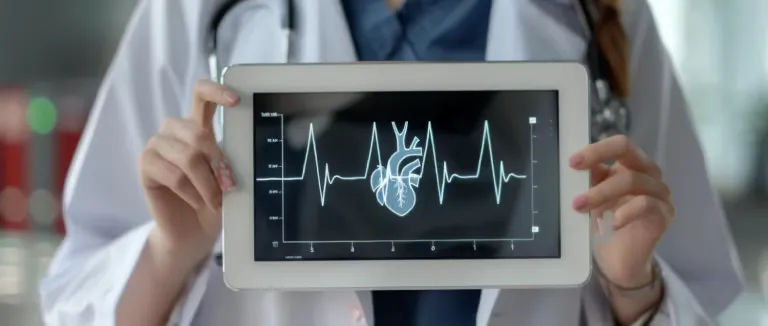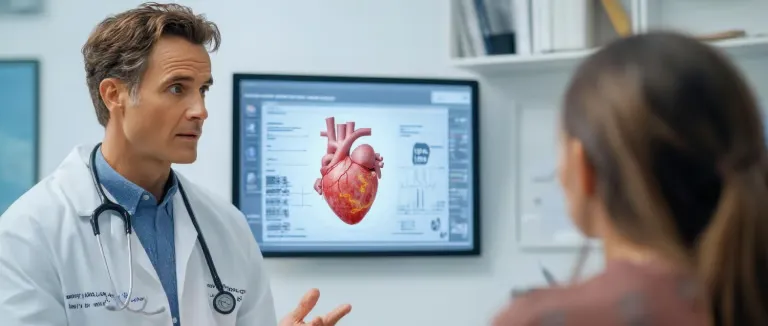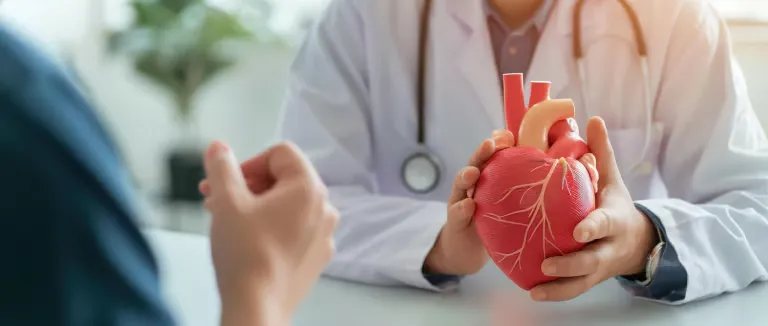-
Understanding the Importance of a Heart Health
-
Who Needs a Heart Health Checkup and When?
-
What Does a Comprehensive Heart Checkup Include?
-
Preparing for Your Heart Health Checkup at Liv Hospital
-
Understanding Your Heart Checkup Results
-
Heart Health Checkup Costs and Packages
-
Liv Hospital’s Expertise in Heart Health Screening
-
Maintaining Your Heart Health After a Checkup
-
Frequently Asked Questions
A Heart Health Checkup (also called a Cardiac Checkup) is a series of tests and evaluations designed to assess how well your heart is functioning and to detect early signs of heart disease. Regular screenings are a simple and effective way to check heart health and prevent serious cardiovascular problems.

Understanding the Importance of a Heart Health
Understanding the importance of a heart health checkup is essential for maintaining long-term well-being, as heart disease often develops silently and without noticeable symptoms. Regular checkups help detect risk factors like high blood pressure, high cholesterol, and diabetes early—before they lead to serious complications such as heart attacks or strokes. By identifying potential problems early, a heart health checkup allows for timely lifestyle changes or medical interventions that can significantly reduce the risk of cardiovascular events. In short, routine cardiac evaluations are a proactive step toward a healthier, longer life.
What is a Heart Health Checkup?
A heart health checkup is a comprehensive medical evaluation designed to assess your cardiovascular system, detect early signs of heart disease, and guide lifestyle or treatment interventions. It involves a range of diagnostic tests, clinical assessments, and consultations with specialists.
Why are Routine Heart Screenings Crucial?
Heart disease is one of the leading causes of death globally, and many conditions develop silently over years. Routine heart health screenings help detect risk factors like high blood pressure, high cholesterol, or early atherosclerosis, before symptoms appear.
Benefits of Early Detection of Heart Conditions
- Prevent major cardiac events like heart attacks and strokes
- Identify modifiable risk factors early
- Start timely treatment or lifestyle changes
- Reduce long-term healthcare costs
Who Needs a Heart Health Checkup and When?
It's important to know when to get a heart checkup, especially if you have a family history of heart disease or are over the age of 40. Common signs for a heart checkup include chest pain, shortness of breath, and persistent fatigue.
Maintaining heart health requires a balanced diet, regular exercise, and avoiding smoking.
Age Recommendations for Starting Heart Checkups
- Men over 40 and women over 50 should consider annual screenings
- Individuals with risk factors may need earlier assessments
Key Risk Factors for Heart Disease
You may need a heart checkup sooner if you have:
- Diabetes or prediabetes
- Hypertension (high blood pressure)
- High cholesterol
- Obesity
- Smoking history
- Family history of heart disease
- Sedentary lifestyle or chronic stress
Signs and Symptoms That Indicate a Need for a Heart Checkup
- Chest discomfort or pain
- Shortness of breath
- Irregular heartbeat or palpitations
- Dizziness or fatigue
- Swelling in legs or ankles
Recommended Frequency for Heart Screenings
- Every 1–2 years for low-risk individuals
- Annually for those with existing risk factors or chronic conditions
What Does a Comprehensive Heart Checkup Include?
Initial Consultation and Medical History Review
A specialist will assess your personal and family history, lifestyle, and existing health conditions.
Physical Examination and Vital Signs
- Blood pressure
- Heart rate and rhythm
- Weight/BMI and waist circumference
Common Heart Checkup Tests Explained
Common heart checkup tests, such as blood pressure measurement, cholesterol and glucose tests, ECG, and echocardiogram, help assess heart function, detect early signs of disease, and guide preventive care.
Electrocardiogram (ECG/EKG)
A quick, painless test that records the heart’s electrical activity to detect arrhythmias, previous heart attacks, or abnormalities.
Echocardiogram (Echo)
An ultrasound-based test that evaluates heart structure and function, including valve activity and heart muscle strength.
Stress Tests (Treadmill Test)
Performed to evaluate how your heart performs under physical exertion. It may reveal hidden ischemia or arrhythmias.
Essential Blood Tests for Heart Health
- Lipid profile (cholesterol and triglycerides)
- Blood sugar (HbA1c or fasting glucose)
- Inflammatory markers (CRP)
Advanced Imaging Options
In some cases, additional tests like a CT angiogram or cardiac MRI may be recommended.

Preparing for Your Heart Health Checkup at Liv Hospital
Instructions Before Your Appointment
- Fast for 8–10 hours before blood tests
- Wear comfortable clothes for stress testing
- Bring a list of your medications
What to Bring and What to Expect on the Day
- Your medical records, if available
- Passport/ID for international patients
- Expect your appointment to last 2–3 hours depending on the number of tests
Understanding Your Heart Checkup Results
How Results are Communicated
Your doctor will review all test results during a follow-up consultation or through Liv Hospital’s secure patient portal.
Interpreting Key Findings
You will receive a personalized summary of:
- Cholesterol levels
- Blood pressure trends
- Heart rhythm and structural findings
- Cardiovascular risk score
Next Steps Based on Your Screening Results
- Recommendations for lifestyle changes
- Further testing or referrals.
- Possible medication adjustments or new prescriptions
Heart Health Checkup Costs and Packages
Factors Influencing the Cost of a Heart Checkup
Prices may vary based on:
- Number and type of tests
- Age and risk profile
- Additional imaging or specialist consultations
Overview of Heart Checkup Packages at Liv Hospital
Liv Hospital offers comprehensive, tiered packages for different needs. Packages may include:
- ECG + Echo + Blood Tests
- Stress Test + Lipid Panel
- Full Cardiology Workup with Imaging
Why Choose Turkey for Your Heart Health Needs?
Turkey has become a global leader in affordable, high-quality healthcare. At Liv Hospital, you’ll benefit from:
- International standards of care
- Multilingual teams
- State-of-the-art diagnostics
Liv Hospital’s Expertise in Heart Health Screening
Our State-of-the-Art Cardiology Department
Liv Hospital’s cardiology department is equipped to manage both routine screenings and complex cardiac evaluations.
Advanced Diagnostic Technology
We use tools like 3D echocardiography, coronary CT angiography, and holter monitoring for precise diagnosis.
Experienced Cardiologists and Multilingual Staff
Our board-certified team ensures you receive personalized care in your language—whether you speak English, Arabic, Russian, or another.
Maintaining Your Heart Health After a Checkup
Lifestyle Recommendations
- Eat a heart-healthy diet (low in salt, sugar, and trans fats)
- Exercise 150 minutes per week
- Quit smoking and limit alcohol
- Manage stress and sleep well
Follow-Up Appointments and Monitoring
Your doctor may recommend routine follow-ups or refer you to our cardiovascular surgery or blood pressure management specialists as needed.
Frequently Asked Questions
Doctors often ask heart checkup screening questions such as whether you experience chest pain, shortness of breath, have high blood pressure or cholesterol, smoke, or have a family history of heart disease.
What tests are included in a standard heart health checkup?
Typically, ECG, echo, stress test, and blood tests like lipid profile.
How often should I get a heart checkup?
Every 1–2 years, or more often if you have risk factors.
Are heart checkups painful?
Most tests are non-invasive and painless.
How long does a heart health screening take?
Heart health screenings typically take 2–3 hours, including all consultations and tests.
What is the difference between an ECG and an Echocardiogram?
- ECG shows heart’s electrical activity
- Echo shows the heart’s structure and motion via ultrasound
Can a heart checkup detect all heart problems?
It detects most common and silent issues, but some conditions may require more advanced diagnostics like angiogram.
Is fasting required before a heart checkup?
Yes, especially for blood glucose and cholesterol tests.
What is the cost of a heart health checkup at Liv Hospital?
The cost of a heart checkup can vary depending on the tests included, but you want learn right price you can ask our call center.
Costs vary by package. Contact us for personalized pricing or explore our health check-up options.
* Contents of this page is for informational purposes only. Please consult your doctor for diagnosis and treatment. The content of this page does not include information on medicinal health care at Liv Hospital .







